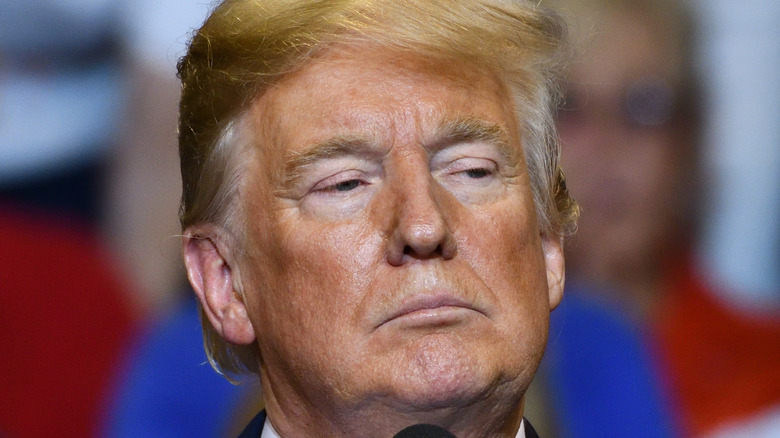What Is The Espionage Act?
On August 13, a search warrant was unsealed, revealing more information about what federal authorities were looking for when they removed documents from Mar-a-Lago. According to Politico, the search warrant indicates that the F.B.I. is investigating former president Donald Trump for a "potential violation of the Espionage Act." The New York Times reported that the search warrant indicated the F.B.I. had probable cause to believe the former president had "classified/TS/SCI — shorthand for 'top secret/sensitive compartmented information.'" This kind of sensitive government information is only meant to be viewed in a secure government facility. The Times noted the F.B.I. seized 11 boxes of documents from Mar-a-Lago on August 8.
After spending most of the week claiming that the F.B.I. had "planted evidence" at Mar-a-Lago, the former president's team made a statement. Late in the day on August 12, the 45th president's office claimed, "He had a standing order that documents removed from the Oval Office taken to the residence were deemed to be declassified..."
Conservative attorney George Conway told CNN of the justification, "They have been making all sorts of insane arguments, arguing that the FBI planted documents, arguing that somehow ... he held [documents] to his head and declassified them like that. None of this makes sense at all." Conway added, "In order to have them from the White House, he probably brought them up to the residence. He had no business bringing top secret SCI materials from the situation room or Oval Office to the residence."
So — with all that in mind — what is the Espionage Act?
The Espionage Act and what was found at Mar-a-Lago
The U.S. Justice Department is investigating whether former president Donald Trump violated the Espionage Act, a.k.a. Section 793 of Title 18 of the U.S. Code. According to USA Today, the Espionage Act of 1917 was passed at the start of World War I and is still on the books today. It makes it a crime to seek out information with the intention of using it against the United States or for any foreign nation's gain. It also forbids the "capture photographs or copy descriptions" of information for this purpose. The outlet reported that the Espionage Act of 1917 was created during wartime, but the law is used in modern times to prevent leaks of United States' national security information.
While "espionage" conjures up visions of spies, the law is about protecting information related to America's national defense. Former F.B.I. Special Agent Asha Rangappa explained the Espionage Act on Twitter. Rangappa tweeted that the law concerns "information related to the national defense." In addition to the Espionage Act, there were two other laws listed on the F.B.I. search warrant that Trump may have violated.
According to The Washington Post, the second law is Section 1519, which prohibits destroying or concealing documents or records "with the intent to impede, obstruct or influence" an investigation. The third law that was in the warrant, Section 2071, criminalizes the theft or destruction of government documents. The search warrant didn't indicate any other information.
What does Donald Trump's future look like amid the raid's fallout?
Amid the Mar-a-Lago raid and the search's fallout, many have been wondering what Donald Trump's future may look like. Is he facing criminal charges? Will he be allowed to run for office again? With the former president's language surrounding a run in 2024 already incredibly clear, the raid at his Florida residence brings his fate into question. As it turns out, the three aforementioned laws included on the warrant – Section 793, Section 1519, and Section 2071 — all carry incarceration time if the person or persons responsible are charged and found guilty, as noted by CNBC.
Starting with Section 793 — violating this law by the act of "gathering, transmitting or losing defense information" carries with it a prison sentence of up to 10 years. Violating Section 1519, which covers the "destruction, alteration, or falsification of records," presents up to a 20 year prison sentence. Lastly, violating Section 2071 and the removal of official documents presents a three year prison sentence and a disqualification from holding public office.
While Trump has not yet been charged with any of the aforementioned violations, time will tell if he can recover both politically and personally.


